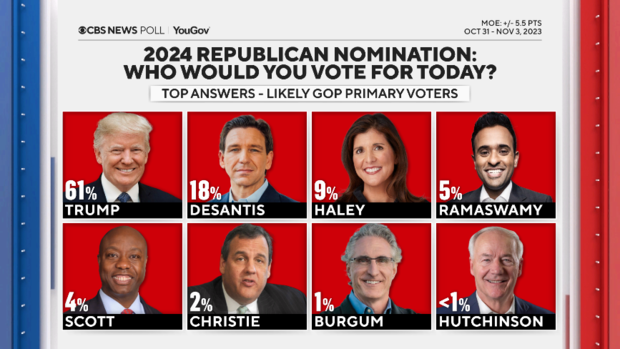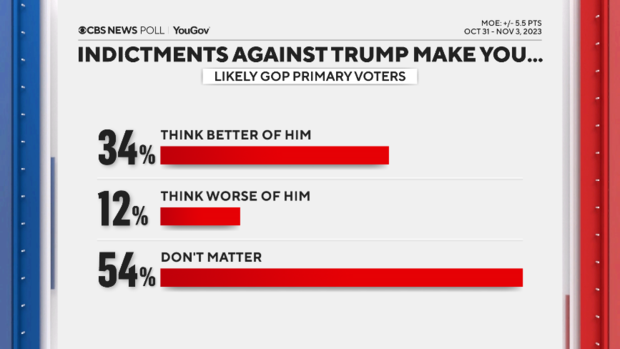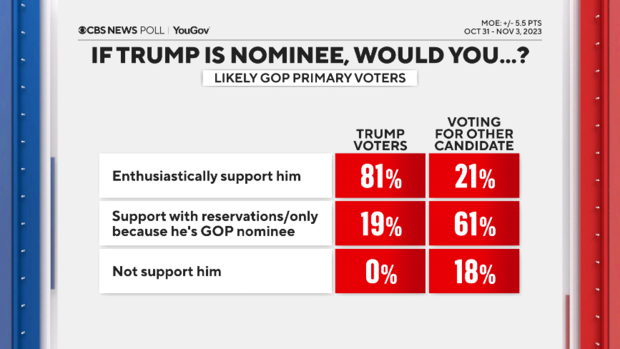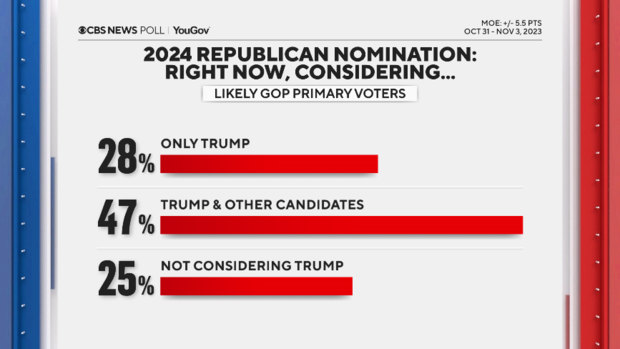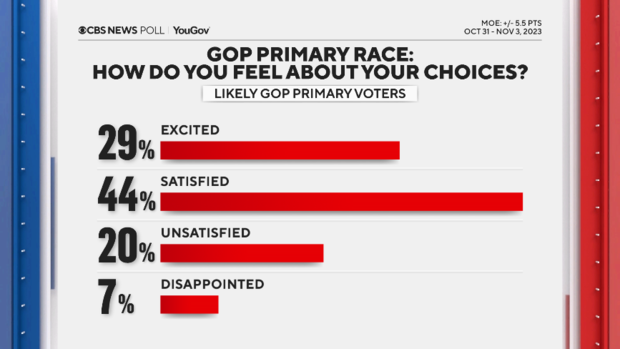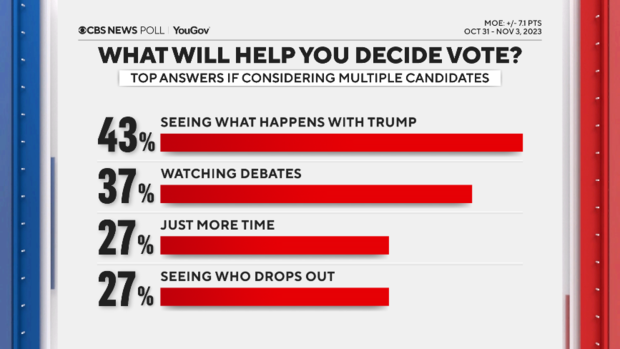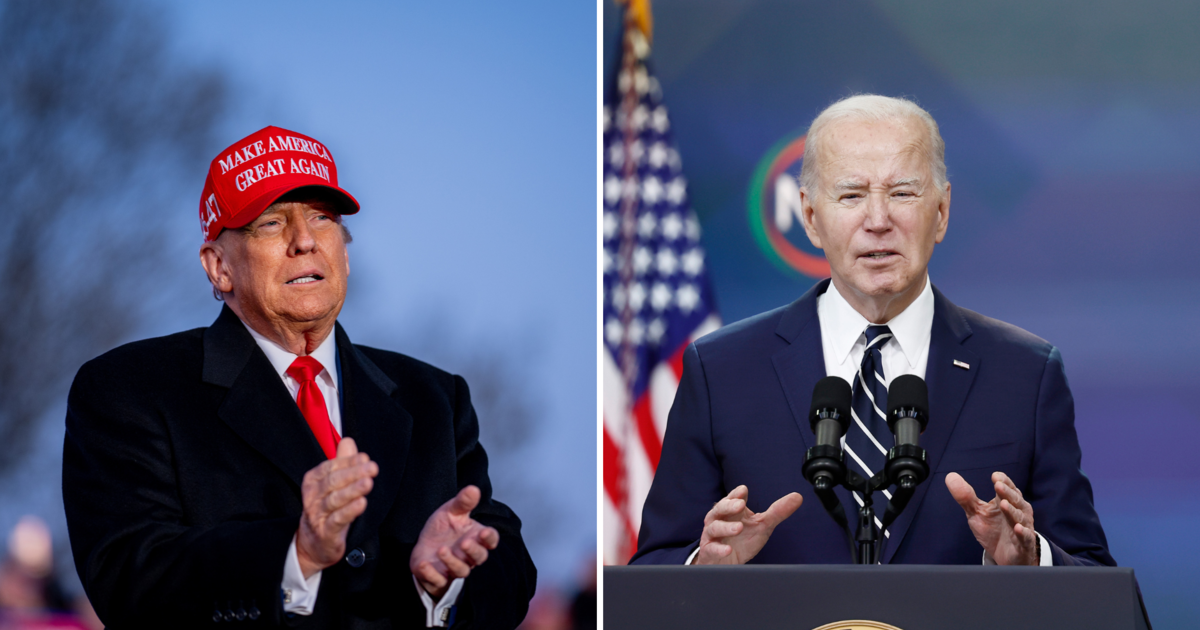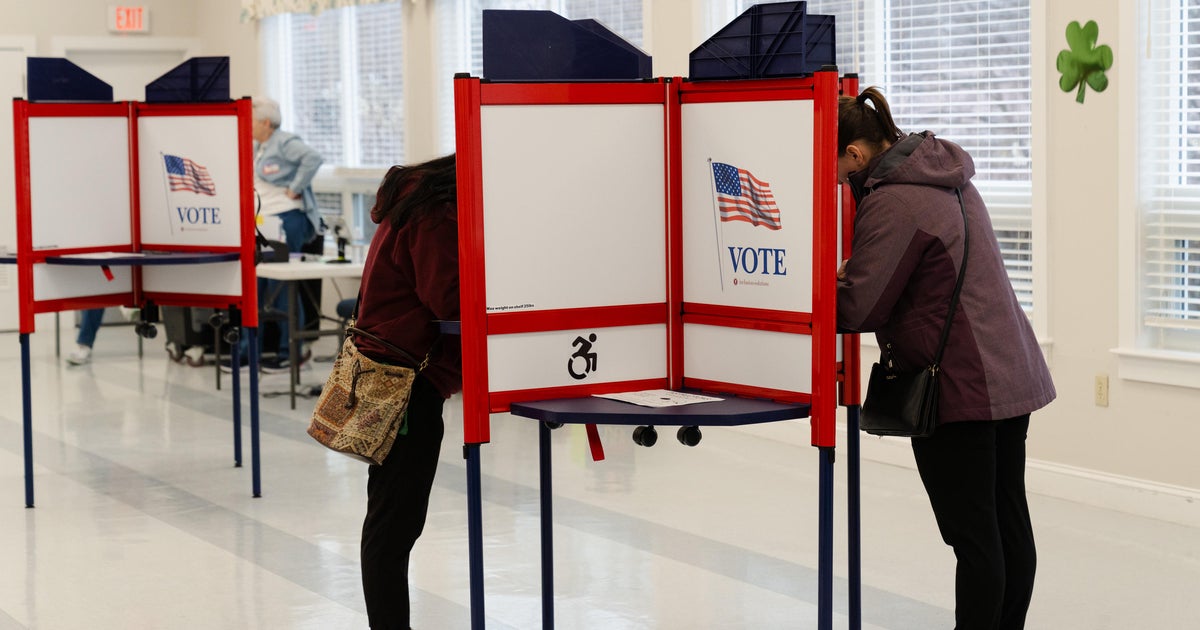Trump maintains dominant lead among 2024 Republican candidates as GOP field narrows: CBS News poll
With just 10 weeks until the presidential primary season kicks off in Iowa, the Republican race looks much the same as it has for months. Former President Donald Trump retains a commanding lead nationally, with GOP primary voters still seeing him as best positioned to beat President Biden. Most would back Trump enthusiastically, were he to be renominated.
One of the few notable changes is that Nikki Haley has gained consideration and now comes in third in current support, behind Ron DeSantis but ahead of Vivek Ramaswamy. Still, Haley's support is still in single digits. And so far, Haley and others haven't converted a sizable share of voters considering them into actual departures from the Trump camp.
With Mike Pence and other candidates dropping out, there's been speculation about what could happen as the field consolidates. Which candidates might voters coalesce around, and would this threaten Trump's lead? We explored this question by having voters imagine a smaller field and rank a shorter list of candidates, measuring their second and third choices.
First of all, it would not change the fact that Trump leads. After that, it's DeSantis, not Haley, who stands to gain the most from a hypothetical consolidation at the moment: nearly half the electorate picks him second over the next two candidates in the standings. In a ranked-choice voting simulation, Haley quickly runs out of potential backers and remains in distant third. That said, DeSantis only gains on Trump by a handful of points in this simulation, ending up with just a third of the vote in the final round to Trump's two-thirds.
Trump's continued dominance
While formidable, the six in 10 Republican voters backing Trump is unchanged from his support level in August and June. As far as the various charges brought against him, most Republican voters aren't following the news very closely. And most say it doesn't matter to their evaluation of the former president, making them think neither better nor worse of him.
Nor is there evidence that the recent spate of legal hearings and trials have made Republicans more concerned Trump would be a liability in the general election. To the contrary, seven in 10 say Trump would definitely beat Biden in a rematch next year. If anything, that's a bit more than said so this summer, and no other GOP candidate comes close on perceived electability.
Most Republican voters would enthusiastically support Trump if he were renominated in 2024, which is perhaps unsurprising, given the overwhelming support for his candidacy. While most non-Trump voters would support him with reservations or only because he'd be the party nominee, few say they flat out wouldn't support him (and they are entirely voters who aren't considering him at all).
That said, the share of the electorate that has settled on Trump has not grown at all. As before, about a quarter of the electorate is considering Trump and nobody else — and as we've seen since we began polling this race, half are considering Trump and at least one other candidate.
The second tier of Republican candidates
Nationally at least, DeSantis is still clearly in second place, both in terms of current preferences and consideration. Though Haley has gained on him, DeSantis enjoys double her support level. And his numbers have stabilized a bit after a slide this summer. His support, consideration, and perceived electability have all rebounded somewhat since August, though he was doing better on all three measures in June.
Meanwhile, Haley's consideration has doubled, and her perceived electability is also somewhat higher than it was over the summer. While most voters don't express confidence in her to beat Biden, fewer now describe her as a "long shot" to win the general election.
Most Republican voters are at least satisfied with the current field of candidates running for the nomination, if not excited about it. Trump voters are the most likely segment of the electorate to express downright excitement, while those who aren't considering him are as likely to express dissatisfaction and satisfaction.
Ranked choices in a consolidating GOP field
With fewer candidates qualifying for debates and others dropping out, we explore what could happen as the field consolidates further. Specifically, we asked voters to imagine that their first choice wasn't running and then rank a shorter list of candidates that included Trump, DeSantis, Haley, and Ramaswamy (excluding their first choice, if it was one of these four).
We obtained a set of rankings for every respondent, from their first to at least fourth choice, enabling us to drop candidates sequentially and estimate which of the remaining candidates voters currently prefer — a procedure akin to ranked-choice voting. Voters' rankings could of course change before the field winnows again, so the analysis reflects where things are today.
Trump does not gain much at all when field is narrowed to a four-way race, because most voters backing lower-tier candidates — Tim Scott or below — list Trump as their last choice among the four options given. When forced to choose, they list DeSantis and Haley as their second choice in equal measure, giving both candidates a similar but small boost.
At the moment, however, it looks like Trump could gain from Ramaswamy and Haley backers. Imagining Ramaswamy isn't running and reallocating his support based on his voters' second choices, we find Trump and DeSantis both gaining a bit. Haley doesn't, as Ramaswamy voters nearly all rank Trump or DeSantis ahead of her.
With Haley currently in a distant third, what would happen if we imagine she weren't running? Her voters by and large prefer DeSantis to Trump, so DeSantis gains the most. But again, all this consolidation leaves him with just a third of the vote in a head-to-head matchup with Trump.
The upshot is that while DeSantis' consideration and second-choice numbers are deep enough to give him a boost were candidates to drop out, it's a far cry from making the race competitive at the moment. For that to happen, DeSantis needs to persuade a chunk of Trump's backers to abandon ship. It's a difficult task but not impossible, as many of them are actively considering DeSantis and most of them consider him their second choice.
Looking ahead to primaries
If voters are still considering more than one candidate, what do they say will help them make a final decision? Among Trump voters considering at least one other person, the most frequently selected option is "Seeing what happens with Trump." Non-Trump voters are more likely than Trump voters to say watching debates and learning about other candidates.
Importantly, only a third of Republican primary voters say they're following the nomination race very closely, and most continue to consider more than one candidate — with non-Trump voters more likely to be considering two or more.
Typically, voters start to pay closer attention once actual votes are cast in the early nominating contests. At this rate, it may take a Trump challenger posting a better-than-expected showing in one of these states to meaningfully shake up the race. And even that may not be enough.
This CBS News/YouGov survey was conducted with a nationally representative sample of 2,185 U.S. adult residents interviewed between October 31-November 3, 2023, including 556 likely Republican primary voters. The sample was weighted according to gender, age, race, and education based on the U.S. Census American Community Survey and Current Population Survey, as well as past vote. The margin of error is ±2.7 points for the sample overall and ±5.5 points for likely Republican primary voters.
